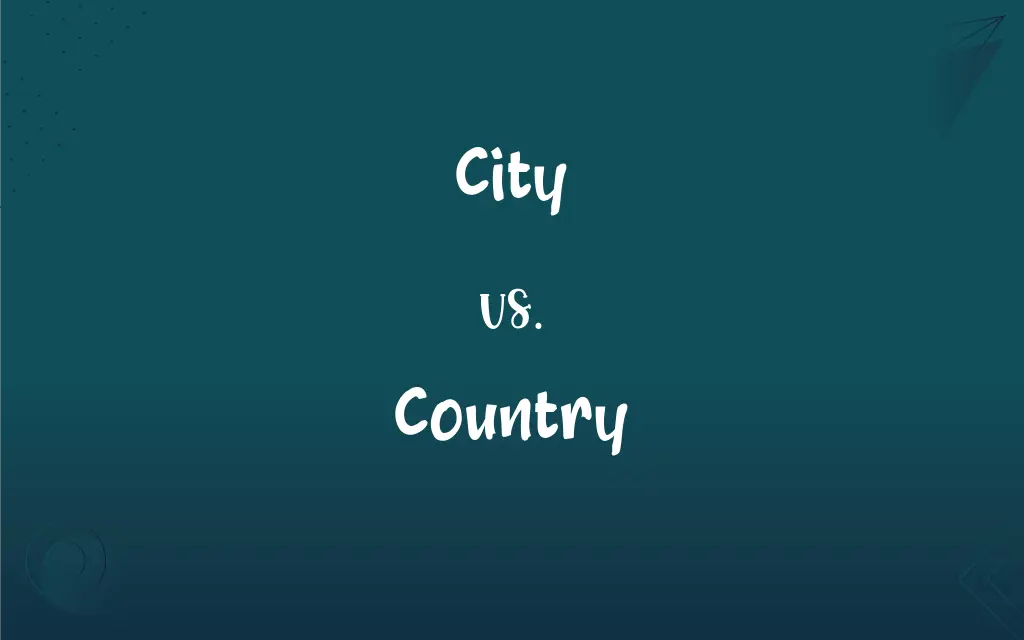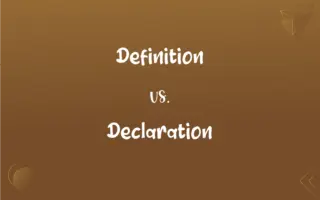City vs. Country: What's the Difference?
Edited by Aimie Carlson || By Harlon Moss || Updated on October 23, 2023
A city is an urban center, while a country is a nation or territory.

Key Differences
A city is a densely populated area with advanced infrastructures and numerous buildings. In contrast, a country encompasses both urban and rural territories and represents a larger geographical area with diverse landscapes.
City life often involves fast-paced activities, heightened technological advancements, and various cultural happenings. On the other hand, a country consists of cities, towns, villages, and natural landscapes, offering a broader spectrum of lifestyles.
While cities can be viewed as microcosms of human society with specific cultural, economic, and social dynamics, countries represent a more holistic picture, inclusive of numerous cities, different cultures, and vast histories.
Governance in a city pertains to local administration, focusing on municipal affairs; whereas, in a country, the governance is national, attending to both local and international matters.
Comparison Chart
Definition
An urban area with dense population.
A nation or territory.
ADVERTISEMENT
Grammatical Usage
Typically a singular or plural noun.
Typically a singular or plural noun.
Scale
Smaller, localized region.
Larger, encompassing region.
Associated Words
Urban, metropolitan, downtown.
National, rural, territorial.
Connotation
Bustling, modern, busy.
Broad, diverse, sovereign.
City and Country Definitions
City
A city is characterized by its infrastructure and amenities.
The city offers various recreational facilities.
ADVERTISEMENT
Country
A country is recognized as an independent nation.
France is a country with a rich history.
City
A city is an administrative division in some countries.
Los Angeles is a major city in California.
Country
A country is a distinct territorial body or political entity.
Canada is a country located in North America.
City
A city is a large human settlement.
I visited New York City for the first time last summer.
Country
A country has its own system of government and laws.
The country announced new immigration policies.
City
A city often has a governing body and charter.
The city council approved the new budget.
Country
A country has cultural, historical, and geographical significance.
The country's diverse landscapes attract tourists from all over the world.
City
A city is a hub of economic, cultural, and social activities.
The city hosts numerous festivals every year.
Country
A country encompasses various cities, towns, and villages.
The country has both bustling cities and serene villages.
City
A center of population, commerce, and culture; a town of significant size and importance.
Country
A nation or state.
FAQs
What is a city?
A city is a large and densely populated urban area.
What defines a country's boundaries?
A country's boundaries are often defined by historical, political, and geographical factors.
How does a city differ from a town?
A city is usually larger than a town and has a specific administrative status.
Can a city span two countries?
Yes, some cities, like Istanbul, span two continents or countries.
What is the cultural significance of a country?
A country represents a collective identity, history, values, and traditions.
What's the difference between city life and country life?
City life is often fast-paced with more amenities, while country life is quieter and closer to nature.
What binds the cities and towns within a country?
Shared governance, infrastructure, culture, and economic systems.
Do all countries have cities?
Yes, every country has urban centers, though their size and significance vary.
Which is bigger, a city or a country?
A country is larger as it encompasses various cities, towns, and landscapes.
Can a city be bigger than a country in terms of population?
Yes, some cities, like Tokyo, have populations larger than some smaller countries.
Why are cities often near water sources?
For transportation, trade, and resources.
What defines the sovereignty of a country?
Sovereignty is the full right and power of a governing body to govern itself without outside interference.
Can a city have its own laws differing from the country?
Yes, cities can have local ordinances, but they must comply with national laws.
How does population density differ between city and country?
Cities usually have higher population densities than rural country areas.
How do cities contribute to a country's economy?
Cities are economic hubs with businesses, services, and industries fueling the country's economy.
Can the name of a city be the same as a country?
Yes, for example, Mexico City in the country of Mexico.
Is a capital city always the largest city in a country?
No, a capital city is the administrative center, but not always the largest.
How is governance different in a city vs. a country?
City governance focuses on local issues, while country governance addresses national matters.
Why do people migrate from the country to the city?
For opportunities like jobs, education, and amenities.
What's the role of a country's flag and anthem?
They symbolize the country's identity, values, and history.
About Author
Written by
Harlon MossHarlon is a seasoned quality moderator and accomplished content writer for Difference Wiki. An alumnus of the prestigious University of California, he earned his degree in Computer Science. Leveraging his academic background, Harlon brings a meticulous and informed perspective to his work, ensuring content accuracy and excellence.
Edited by
Aimie CarlsonAimie Carlson, holding a master's degree in English literature, is a fervent English language enthusiast. She lends her writing talents to Difference Wiki, a prominent website that specializes in comparisons, offering readers insightful analyses that both captivate and inform.







































































